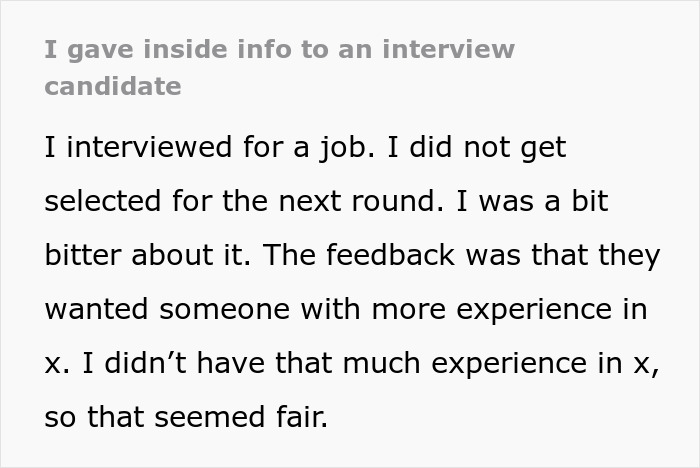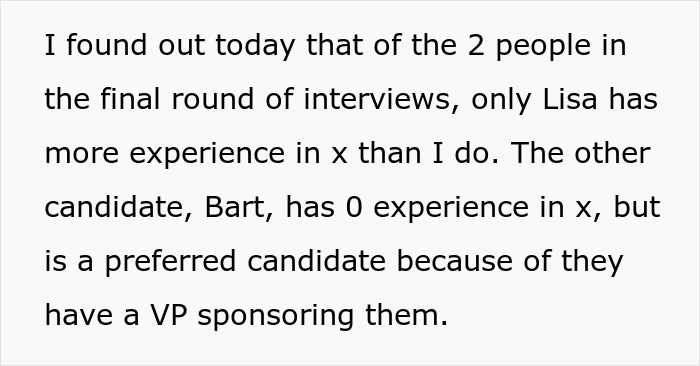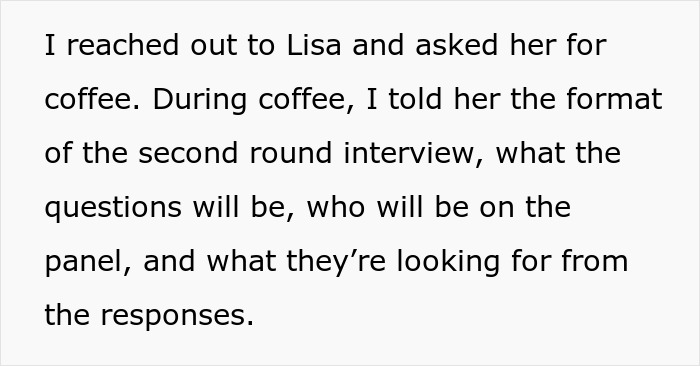Person Reveals Interview Secrets To Applicant, Making Sure Candidate With Unfair Advantage Loses
If you’ve been in the job market long enough, chances are you’ve encountered a situation where you lost out on a job just because the other candidate had better connections than you. At times like these, it’s easy to feel helpless in the absurdity of the system that you can do nothing about.
But, as one Redditor shared, every once in a while, the tables turn. After not passing the first round due to lack of experience, the person found out that out of the two remaining candidates, one didn’t have any experience and was only there because he had extra support. Having a chance for some petty revenge, the person decided to reach out to the other applicant and offered her inside information. Scroll down to read the full story!
More info: Reddit
Favoritism is annoying and unfair to everyone but the people who are benefiting from it, but it’s still an issue that occurs way too often
Image credits: MART PRODUCTION (not the actual photo)
A person interviewed for a job and was informed that they didn’t pass through to the final round due to lack of experience
Image credits: Roxanne Minnish (not the actual photo)
A little later, they found out that one of the two remaining candidates who passed had no experience at all and was there because he was favorited by the company’s VP
Image credits: u/pahblahpahhumbug
The person got livid, met up with the other candidate, and shared the inside information with her to help her get on even ground
The OP interviewed for a job but was not selected for the next round. Understandably, they were a little bitter about it, but since the position was for managing people working with an unnamed thing in which the author didn’t have enough experience, the judgment seemed fair.
However, a little while later, they found out that out of the last two people in the final round, only one of them had more of the required experience than the OP, while the other one didn’t have any at all. This got the person livid.
Since the interview was for a job in the OP’s department, as they explained in some of the comment replies, and they didn’t make it into the second round, they were offered to add input for it. Thus, they had a chance to learn the questions and format as well as figure out who the participants were. Having that information, the poster decided to reach out to the other more qualified interviewee and share this information with her.
The author later added that while the person with the backing from someone of the higher-ups wasn’t a bad guy, having no experience made him unqualified, and he shouldn’t have passed in the first place.
While, at first, there were some questions that needed to be answered by the OP, and some commenters theorized that this situation had no good outcome, most of them supported the poster acting against favoritism. Additionally, they also shared their own similar stories, only further proving why picking someone you like over someone qualified is a bad idea.
Image credits: cottonbro studio (not the actual photo)
Favoritism in the workplace can become a real issue if left unchecked. But to battle it, we first need to know what it is exactly, how it happens, and what to do when it does.
So, first, what is favoritism? Well, Jateenkumar Suthar, in a LinkedIn post, described it as an unfair preferential treatment of one or a few people over others, which can occur anywhere but is most often observed in the workplace.
This type of behavior can be caused by many reasons, with the most common ones being personal or family relationships, race, gender, age, or other characteristics’ biases, and office politics.
But whatever form it takes, favoritism almost always brings negative consequences. It creates a toxic environment, making the employees feel unvalued and wronged, eventually leading to them leaving the company, which ends up damaging its reputation.
Image credits: Alexander Suhorucov (not the actual photo)
There are many ways in which this unwanted behavior can manifest. According to Elisabeth Perry of BetterUp, the signs of a manager favoriting someone involve taking sides, dismissing violations, unfair task distributions, promotions, bonuses and benefits, imbalanced recognition, selective feedback and suggestions, and so on.
However, it’s important to note that favoritism in the workplace can happen not only between leaders and workers but also among coworkers. For example, employees might form hierarchies and limit information flow for those they dislike or choose not to recommend them for new internal opportunities.
Fortunately, there are always ways to improve the situation. Managers could start by training their teams, creating a system that shows why things are happening the way they are, being transparent, and leading by example.
At the same time, employees who witness things going in the wrong direction should analyze the situation and approach it by speaking up or taking the matter up with their superiors or the HR department.
In the end, favoritism doesn’t always come from bad intentions, as it is in our nature to prioritize our own success and make decisions that improve our relationships and our own position. Yet, if we engage in it consciously, it can create problems for us and everyone around us. Then, candidates sharing inside information with each other might be the least of your problems.
Do you think the OP made the right decision? How would you have acted in their place? Share your thoughts below!
While some commenters asked additional questions, which the poster answered, others shared their own stories and commended the person for standing up against favoritism
[ad_2]
If you’ve been in the job market long enough, chances are you’ve encountered a situation where you lost out on a job just because the other candidate had better connections than you. At times like these, it’s easy to feel helpless in the absurdity of the system that you can do nothing about.
But, as one Redditor shared, every once in a while, the tables turn. After not passing the first round due to lack of experience, the person found out that out of the two remaining candidates, one didn’t have any experience and was only there because he had extra support. Having a chance for some petty revenge, the person decided to reach out to the other applicant and offered her inside information. Scroll down to read the full story!
More info: Reddit
Favoritism is annoying and unfair to everyone but the people who are benefiting from it, but it’s still an issue that occurs way too often
Image credits: MART PRODUCTION (not the actual photo)
A person interviewed for a job and was informed that they didn’t pass through to the final round due to lack of experience
Image credits: Roxanne Minnish (not the actual photo)
A little later, they found out that one of the two remaining candidates who passed had no experience at all and was there because he was favorited by the company’s VP
Image credits: u/pahblahpahhumbug
The person got livid, met up with the other candidate, and shared the inside information with her to help her get on even ground
The OP interviewed for a job but was not selected for the next round. Understandably, they were a little bitter about it, but since the position was for managing people working with an unnamed thing in which the author didn’t have enough experience, the judgment seemed fair.
However, a little while later, they found out that out of the last two people in the final round, only one of them had more of the required experience than the OP, while the other one didn’t have any at all. This got the person livid.
Since the interview was for a job in the OP’s department, as they explained in some of the comment replies, and they didn’t make it into the second round, they were offered to add input for it. Thus, they had a chance to learn the questions and format as well as figure out who the participants were. Having that information, the poster decided to reach out to the other more qualified interviewee and share this information with her.
The author later added that while the person with the backing from someone of the higher-ups wasn’t a bad guy, having no experience made him unqualified, and he shouldn’t have passed in the first place.
While, at first, there were some questions that needed to be answered by the OP, and some commenters theorized that this situation had no good outcome, most of them supported the poster acting against favoritism. Additionally, they also shared their own similar stories, only further proving why picking someone you like over someone qualified is a bad idea.
Image credits: cottonbro studio (not the actual photo)
Favoritism in the workplace can become a real issue if left unchecked. But to battle it, we first need to know what it is exactly, how it happens, and what to do when it does.
So, first, what is favoritism? Well, Jateenkumar Suthar, in a LinkedIn post, described it as an unfair preferential treatment of one or a few people over others, which can occur anywhere but is most often observed in the workplace.
This type of behavior can be caused by many reasons, with the most common ones being personal or family relationships, race, gender, age, or other characteristics’ biases, and office politics.
But whatever form it takes, favoritism almost always brings negative consequences. It creates a toxic environment, making the employees feel unvalued and wronged, eventually leading to them leaving the company, which ends up damaging its reputation.
Image credits: Alexander Suhorucov (not the actual photo)
There are many ways in which this unwanted behavior can manifest. According to Elisabeth Perry of BetterUp, the signs of a manager favoriting someone involve taking sides, dismissing violations, unfair task distributions, promotions, bonuses and benefits, imbalanced recognition, selective feedback and suggestions, and so on.
However, it’s important to note that favoritism in the workplace can happen not only between leaders and workers but also among coworkers. For example, employees might form hierarchies and limit information flow for those they dislike or choose not to recommend them for new internal opportunities.
Fortunately, there are always ways to improve the situation. Managers could start by training their teams, creating a system that shows why things are happening the way they are, being transparent, and leading by example.
At the same time, employees who witness things going in the wrong direction should analyze the situation and approach it by speaking up or taking the matter up with their superiors or the HR department.
In the end, favoritism doesn’t always come from bad intentions, as it is in our nature to prioritize our own success and make decisions that improve our relationships and our own position. Yet, if we engage in it consciously, it can create problems for us and everyone around us. Then, candidates sharing inside information with each other might be the least of your problems.
Do you think the OP made the right decision? How would you have acted in their place? Share your thoughts below!
While some commenters asked additional questions, which the poster answered, others shared their own stories and commended the person for standing up against favoritism
Read original article here









